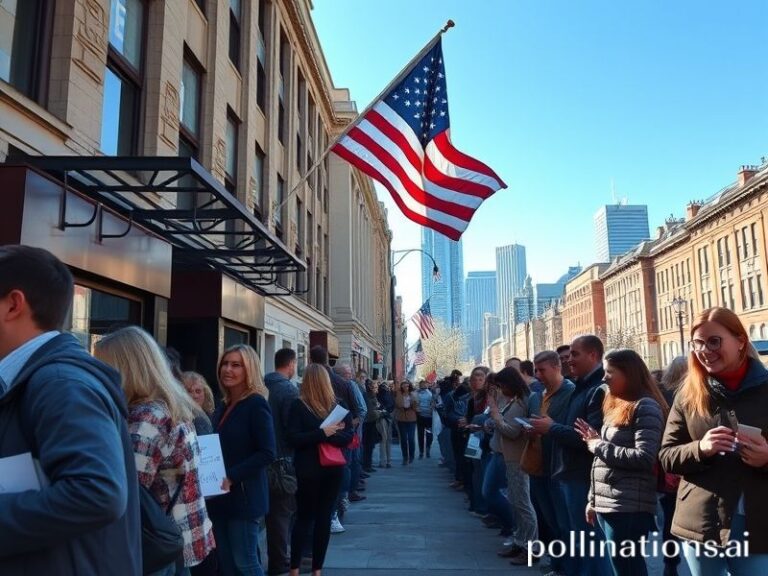From Lagos to Robinhood: How Hood Stock Turned the World into One Giant, Sarcastic Trading Floor
Hood Stock and the Global Bazaar of Rebellious Capital
By G. M. Delacroix, Senior Correspondent, Somewhere over the Mid-Atlantic
It began, as most modern morality tales do, on a subreddit. A horde of screen-locked millennials—armed with stimulus checks, Robinhood accounts, and the attention span of fruit flies—decided that the corner bodega could double as the New York Stock Exchange. They called it “hood stock,” a tongue-in-cheek mash-up of “Robinhood” and “hood economics,” and proceeded to pump everything from GameStop to Ghanaian fintech startups based on nothing more than memes, spite, and a shared conviction that hedge-fund tears taste better than oat-milk lattes.
From Lagos to Lahore, the phenomenon spread like a particularly contagious flu strain. In Nigeria, university students skipped lectures to day-trade shiba inu coin between power outages, reasoning that if the national grid could disappear for six hours, so could their student-loan balances. In Manila, jeepney drivers pooled pesos on Telegram to buy fractional shares of Tesla, betting that Elon’s next tweet would send their children to private school or at least buy better karaoke machines. The joke was on everyone, which is precisely why it worked: the entire planet suddenly discovered that financial nihilism is a lingua franca.
Of course, regulators everywhere clutched their pearls like Victorian matrons at a burlesque show. The SEC issued sternly worded press releases, the EU threatened to label every retail trader a “shadow bank,” and China simply banned the apps, presumably so citizens could refocus on healthier hobbies such as competitive surveillance. Meanwhile, the Bank for International Settlements—think of it as the UN for people who actually read footnotes—quietly noted that “financial conditions have become somewhat exuberant,” which is central-banker for “we’re all going to die, but politely.”
Yet the longer you stare at hood stock, the clearer its geopolitical punchline becomes. Emerging-market governments, desperate to keep restless youth from burning tires in the streets, now tout “retail-inclusion initiatives.” Turkey’s finance minister—last seen defending the lira with the effectiveness of a chocolate teapot—has rebranded day-trading as “digital export potential.” Kenya’s central bank governor gamely suggested that M-Pesa could evolve into a Nairobi-based meme-exchange, proving that when your currency is already a meme, you might as well own the joke.
Ironically, the very volatility that terrifies grey-haired economists is a feature, not a bug, for economies held together by duct tape and diaspora remittances. When Argentine inflation gallops past 100 %, buying Dogecoin is less speculation than survival; when Lebanese banks freeze deposits, turning WhatsApp groups into shadow clearinghouses feels almost civic-minded. In that context, hood stock isn’t a rebellion against capitalism so much as an admission that late-stage capitalism has become a global escape room with the fire alarm disabled.
The cultural spillover is equally delicious. Luxury brands now drop NFTs timed to retail-trading peaks, ensuring that a sixteen-year-old in Jakarta can flip a pixelated Birkin for rent money before Mom notices the Wi-Fi bill. European art fairs auction screenshots of loss porn—yes, those crimson sea-of-red portfolio images—as modern art titled “The Scream, but with Candlesticks.” Even the Vatican, never one to miss a grift, launched a “faith-based ESG” ETF, because nothing says moral rectitude like sanctified greenwashing.
All of which raises a question that would make Adam Smith reach for the Scotch: has the market finally democratized, or have we merely gamified despair? The honest answer is both. Hood stock is a planetary feedback loop in which every participant knows the music will stop, yet dances anyway—because the alternative is admitting that the global economy resembles a Jenga tower built by toddlers on a sugar high.
So, dear reader, if you find yourself at 3 a.m. staring at a candlestick chart while eating instant ramen seasoned with existential dread, take comfort. You are not alone. From the favelas of Rio to the co-working pods of Tallinn, millions are doing the exact same thing, united in the grand human tradition of hoping tomorrow’s absurdity will pay for today’s mistake. And if it doesn’t? Well, there’s always another meme, another coin, another corner of the bazaar where the house lights flicker but never quite go out.







